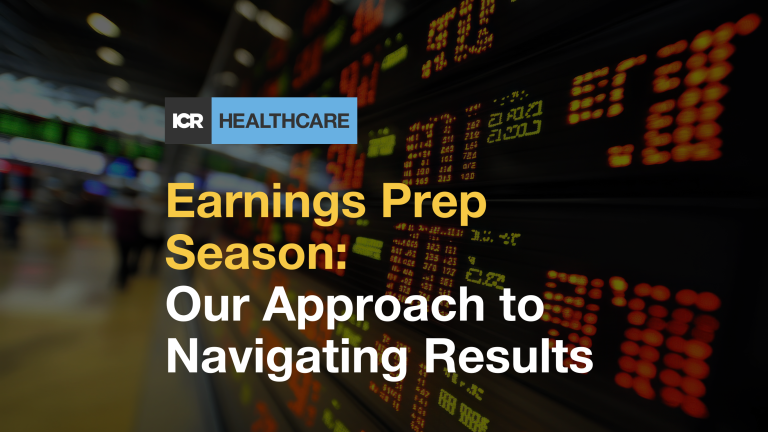The past year has been a difficult one in the IPO market, to say the least. 2022 saw a historic market pullback in deal activity, which in November was down 82% from the same period a year earlier and 53% from the 20-year average. Meanwhile, the Renaissance IPO ETF, a basket of the largest U.S. IPOs over the past three years, was down 50%, compared to a 17% decline in the S&P 500.
All of this raises the question: What will the IPO landscape look like in the year ahead? ICR brought more than 15 IPO industry insiders together for an IPO Summit to offer perspective on this question, how companies can use this pause in the markets to better prepare for an eventual IPO, and how to optimize execution once you start the IPO process.
A Shocking Decline
Matt Kennedy, senior IPO market strategist for Renaissance Capital, called the 2022 IPO pullback “a tremendously shocking decline. Nobody is making money this year in the equity market and issuers are staying away.”
The past year saw a real absence of activity in the broader equity capital markets, especially follow-ons and block trades. “In previous downturns where IPO activity was low, we still saw quite a bit of this activity, but not this time,” said Steve Parish, co-head of ICR Capital. “This has impacted issuers and investors broadly beyond IPOs.”
So, what will recovery in the IPO market look like? Jack Cassel, the head of new listings at Nasdaq, believes that recovery will be gradual. “In previous downturns the government was able to stimulate and prop up the market so we had additional velocity of capital, but we don’t have that arrow in the quiver this time around. As a result, we believe there will be a prolonged recovery over the next several quarters.”
Even so, there is ample dry powder. “What we’re really looking for is investor confidence, which is something we’ve lacked this year given all the variables,” said Cassel. “Our hope is that as soon as we can find the bottom next year, the investor base will start to pick their head up on new issuance and possibly new IPOs.” Cassell is hopeful for a market turn by the second quarter of 2023.
Nick Einhorn, vice president of research at Renaissance Capital, believes that high valuations were both the strength of 2021 and the weakness of 2022. “There’s a reset of expectations and it’s going to take a while until companies are comfortable with the valuations they are able to get in the public markets compared to what they may have gotten in the private markets two years ago.”
Einhorn cites this as a reason why the recovery won’t occur right away next year. “We believe we’ll get back toward normal toward the end of next year, but it won’t be a V-shaped recovery.”
Factors Hindering a Market Recovery
Renaissance Capital’s Kennedy believes there are five specific factors currently hindering a recovery in the IPO market:
- Depressed public market valuations
- Poor returns
- High volatility
- No need for cash due to generous VC rounds
- Time required to shift business focus to profitability
“The antidote for each of these is time,” Kennedy said. “We’ll eventually get there.”
Looking back at other severe market downturns, the IPO market was closed for nearly three years after the dot-com crash and nearly two years after the global financial crisis. “We’ve had a muted IPO market for about a year now so historically speaking, we don’t believe we’ll see a recovery until the middle of 2023 at the earliest,” said Kennedy. “It really depends on how fast market conditions improve.”
Sectors and Companies to Watch
Which sectors or companies could help launch the IPO recovery? ICR’s Parish believes it will be less about sectors and more about which individual companies are performing well and have a need for capital and a strong competitive position. “There will be a focus on profitability, or at least a near-term path to profitability,” he said. “The stronger companies within a broad group of industries could lead the IPO resurgence.”
Parish listed financials, which have benefitted from rising interest rates, along with energy, technology, and healthcare as sectors where he expects to see activity, despite the headwinds some of them are facing.
Einhorn agreed: “It’s usually more about specific companies. Investors want to see growth companies with profitability, or at least signs that they can be profitable. There will be some ‘icebreakers’ and once they come out others will follow.”
Backlog and Pipeline
What are industry insiders seeing in terms of backlog and pipeline and the level of interest from issuers? “I think we’re all equally excited about the backlog of the companies we’ve been tracking that have continued to scale,” said Cassel. “Some of them are looking internally to make sure they’re properly positioned for growth going forward in this new normal.”
With the reorientation from growth to profitability, companies are looking at not only their go-to-market model but also their cost structure and pricing models. “We’re bullish on the pipeline and excited to get these companies out for the world to see,” said Cassel.
Parish said he’s seeing the backlog continuously build and companies that are actively preparing for the IPO market reopening. “This is true whether the reopening is in the middle of next year, the fall or in 2024. More companies today are focused on going public and starting the process, but they’re not rushing to hit the window.”
Measured and Thoughtful Preparation
Companies today are preparing for IPOs in a measured and thoughtful way, which gives them the opportunity to think ahead to earnings calls and their public-facing activities once they’re public. “We believe one positive that will come out of the IPO slowdown is that companies will be better prepared to be public companies,” said Parish.
Kennedy is currently tracking a shadow backlog of 40 companies as potential IPOs. Many of them are in the tech sector — networking, systems software and cybersecurity — as well as discretionary, private equity firms, energy, healthcare and industrial.
Einhorn believes that some companies rushed to IPO in 2021 before they were ready simply because the window was there. “IPO investors benefit coming out of these slow periods because companies that go public are better prepared for it,” he said. “Evidence shows that their performance is stronger coming out of these periods, and hopefully this will be the case next year as well.”
Want to learn more about what the experts are saying about the landscape in 2023? Get the full replay of the ICR IPO Summit.



